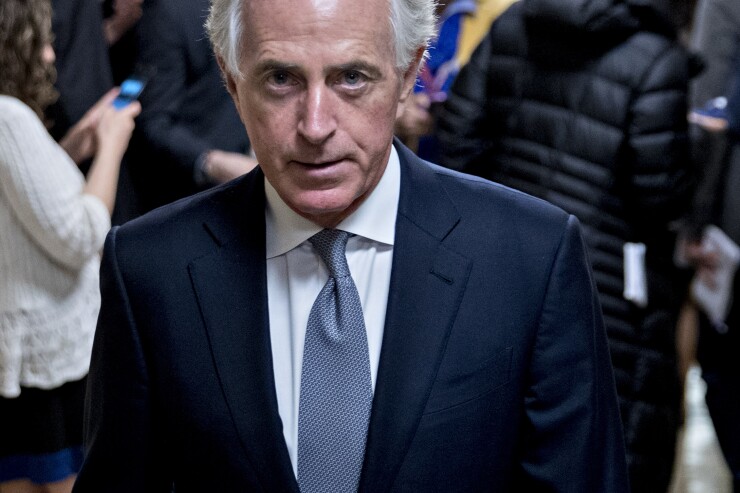WASHINGTON — Senators on Tuesday continued debating a thicket of proposed additions to a crucial regulatory relief bill on their way to a final vote likely to occur as early as midweek.
Among key items under debate are an amendment proposed Monday by Sen. Bob Corker, R-Tenn., dealing with custodial banks. Sen. Sherrod Brown, D-Ohio, the Banking Committee's ranking member, also offered an amendment aimed at preserving restrictions on foreign banks.
In a floor speech on Monday, Brown said a measure inserted into the bill intended to ensure foreign banks do not gain a loophole from provisions in the Dodd-Frank Act did not go far enough.

“There’s a new provision that provides some window dressing," Brown said. "This is a fig leaf of protection to try and convince the public that this bill doesn’t do what it actually does."
After a cloture vote on Monday, the legislation sponsored by Senate Banking Committee Chairman Mike Crapo, R-Idaho, debate was to continue on the Senate floor on Tuesday, teeing it up for a vote as early as Tuesday or Wednesday. Republicans and Democrats are still negotiating which amendments will be considered, if any, but analysts expect the bill to eventually pass.
The legislation would raise Dodd-Frank’s “systemically important financial institution” asset-size threshold from $50 billion to $250 billion and provide a number regulatory relief measures to financial institutions with less than $10 billion by providing exemptions and rolling back compliance requirements.
The House approved a much further-reaching bill to overhaul Dodd-Frank in June, but that package went too far for Senate Democrats who hold substantial influence over what can be passed because of filibuster rules in the upper chamber.
It’s unclear when the House will begin consideration of the legislation to amend Dodd-Frank, but House Financial Services Committee Chairman Jeb Hensarling, R-Texas, who authored the House legislation, has identified roughly 30 bills that have enjoyed bipartisan support but are not included in the Senate deal.
However, moderate Democrats who support the Senate legislation have warned the House from going too far in expanding the bill to relax financial regulations. And in some cases, Republicans have also acquiesced to Democrats who have been critical of provisions that they say could help the biggest banks.
Corker's amendment, which appeared intended to address some Democratic concerns, would seek to remove a provision allowing funds held at a custodial bank and deposited at a central bank to be discounted for capital purposes.
Brown, meanwhile, has also been critical of how the underlying legislation treats foreign banks, which have expansive global operations but have separate legal structures in the U.S. that have assets of less than $250 billion.
The current version of the legislation now being considered by the Senate seeks to clarify that the bill isn’t intended to help large foreign banks like Deutsche Bank. But Brown said that language left too much power in the hands of regulators appointed by the Trump administration.
“The provision provides some vague, ambiguous language that puts the question to the [Federal Reserve]: You can regulate the foreign banks or not — it’s your choice,” said Brown, who opposed the confirmation of Fed Vice Chairman Randal Quarles, the central bank's supervisor.
Brown said he is offering his own amendment that would close the “loophole” and make sure that foreign banks wouldn’t benefit.
“It treats systemically risky foreign banks like systemically risky U.S. banks, not like Huntington, or Fifth Third or Key,” said Brown, pointing to regional banks in Ohio with less than $250 billion in assets.





